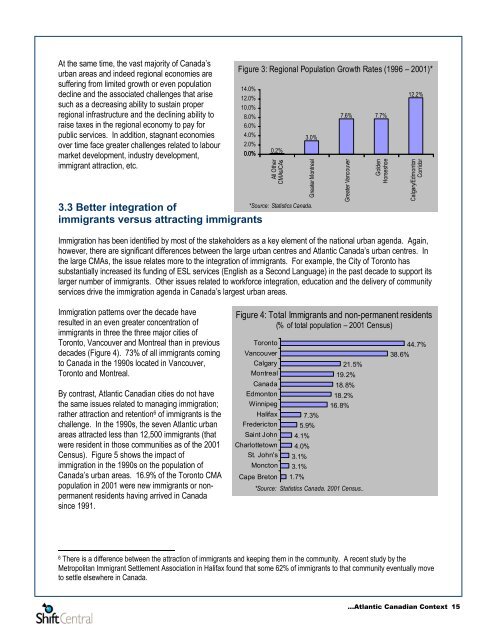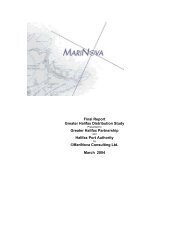Atlantic Canada's Urban Growth Agenda - Greater Halifax Partnership
Atlantic Canada's Urban Growth Agenda - Greater Halifax Partnership
Atlantic Canada's Urban Growth Agenda - Greater Halifax Partnership
You also want an ePaper? Increase the reach of your titles
YUMPU automatically turns print PDFs into web optimized ePapers that Google loves.
At the same time, the vast majority of Canada’s<br />
urban areas and indeed regional economies are<br />
suffering from limited growth or even population<br />
decline and the associated challenges that arise<br />
such as a decreasing ability to sustain proper<br />
regional infrastructure and the declining ability to<br />
raise taxes in the regional economy to pay for<br />
public services. In addition, stagnant economies<br />
over time face greater challenges related to labour<br />
market development, industry development,<br />
immigrant attraction, etc.<br />
3.3 Better integration of<br />
immigrants versus attracting immigrants<br />
Figure 3: Regional Population <strong>Growth</strong> Rates (1996 – 2001)*<br />
14.0%<br />
12.0%<br />
10.0%<br />
8.0%<br />
6.0%<br />
4.0%<br />
2.0%<br />
0.0%<br />
0.2%<br />
All Other<br />
CMAs/CAs<br />
3.0%<br />
<strong>Greater</strong> Montreal<br />
*Source: Statistics Canada.<br />
7.6% 7.7%<br />
Immigration has been identified by most of the stakeholders as a key element of the national urban agenda. Again,<br />
however, there are significant differences between the large urban centres and <strong>Atlantic</strong> Canada’s urban centres. In<br />
the large CMAs, the issue relates more to the integration of immigrants. For example, the City of Toronto has<br />
substantially increased its funding of ESL services (English as a Second Language) in the past decade to support its<br />
larger number of immigrants. Other issues related to workforce integration, education and the delivery of community<br />
services drive the immigration agenda in Canada’s largest urban areas.<br />
<strong>Greater</strong> Vancouver<br />
Golden<br />
Horseshoe<br />
12.2%<br />
Calgary/Edmonton<br />
Corridor<br />
Immigration patterns over the decade have<br />
resulted in an even greater concentration of<br />
immigrants in three the three major cities of<br />
Toronto, Vancouver and Montreal than in previous<br />
decades (Figure 4). 73% of all immigrants coming<br />
to Canada in the 1990s located in Vancouver,<br />
Toronto and Montreal.<br />
By contrast, <strong>Atlantic</strong> Canadian cities do not have<br />
the same issues related to managing immigration;<br />
rather attraction and retention 6 of immigrants is the<br />
challenge. In the 1990s, the seven <strong>Atlantic</strong> urban<br />
areas attracted less than 12,500 immigrants (that<br />
were resident in those communities as of the 2001<br />
Census). Figure 5 shows the impact of<br />
immigration in the 1990s on the population of<br />
Canada’s urban areas. 16.9% of the Toronto CMA<br />
population in 2001 were new immigrants or nonpermanent<br />
residents having arrived in Canada<br />
since 1991.<br />
Figure 4: Total Immigrants and non-permanent residents<br />
(% of total population – 2001 Census)<br />
Toronto<br />
Vancouver<br />
Calgary<br />
Montreal<br />
Canada<br />
Edmonton<br />
Winnipeg<br />
<strong>Halifax</strong><br />
Fredericton<br />
Saint John<br />
Charlottetown<br />
St. John's<br />
Moncton<br />
Cape Breton<br />
4.1%<br />
4.0%<br />
3.1%<br />
3.1%<br />
1.7%<br />
7.3%<br />
5.9%<br />
19.2%<br />
18.8%<br />
18.2%<br />
16.8%<br />
21.5%<br />
*Source: Statistics Canada. 2001 Census..<br />
38.6%<br />
44.7%<br />
6 There is a difference between the attraction of immigrants and keeping them in the community. A recent study by the<br />
Metropolitan Immigrant Settlement Association in <strong>Halifax</strong> found that some 62% of immigrants to that community eventually move<br />
to settle elsewhere in Canada.<br />
…<strong>Atlantic</strong> Canadian Context 15





